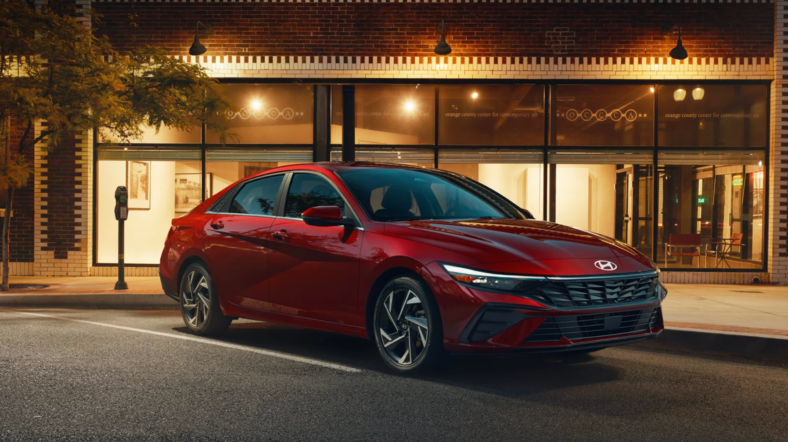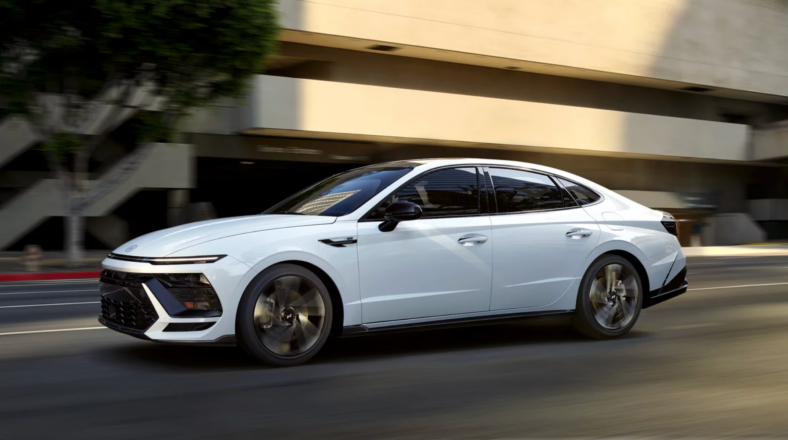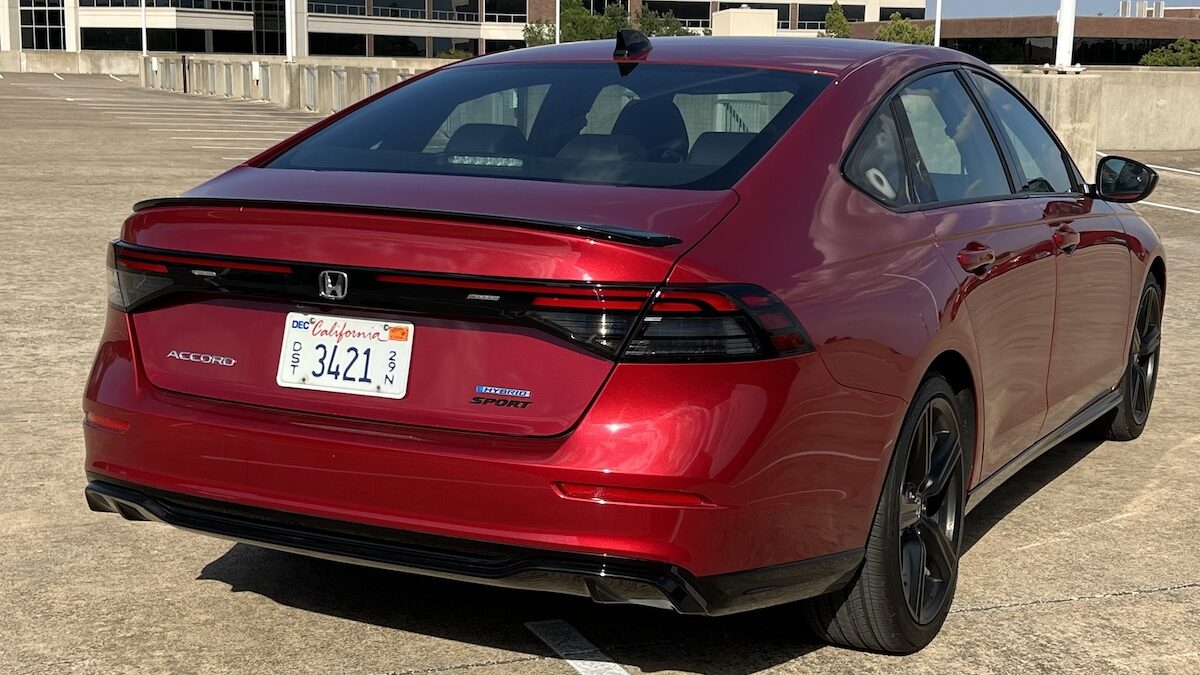Which Is the Better Deal: Gas or Hybrids? A Girl’s Guide to Smart Sedans
Hybrids can save on gas, repair costs, and they hold their value—especially for sedans. But are they with the additional thousands upfront?

If you’re anything like me, you’re constantly juggling your budget while dreaming of a car that won’t guzzle gas like it’s a vanilla latte on a Monday morning. With gas prices doing their usual rollercoaster routine, many of us are eyeing hybrids as a potential money-saving solution.
But are they really worth the extra upfront cost? Let’s dive into the details of five top sedans—the Honda Civic, Toyota Corolla, Hyundai Elantra, Honda Accord, and Hyundai Sonata—to see which version gives you the most bang for your hard-earned bucks.
Hybrids used to be the quirky choice—like that mom who packs seaweed snacks and wears toe shoes. But these days, hybrids are stylish, more powerful, and can be the smarter financial pick—depending on the model, because of the upfront price difference. While they usually hold their value and require less maintenance than gas-only options, the price difference can be a little hard to swallow. So, is it really worth going hybrid?
Let’s look at these six everyday sedans—compact, midsize, luxury, and otherwise—that offer both gas and hybrid versions. We’ll break down MSRP ranges, annual gas savings, general cost differences, and which one gives you more for your money.
This story is 100% human-researched and written based on actual first-person knowledge, extensive experience, and expertise on the subject of cars and trucks.
1. Toyota Corolla: The Reliable Queen Bee

The Toyota Corolla has always been a darling, compact, and affordable sedan. If it wasn’t your first car, you definitely know someone who did have one as their first car. Even after several decades of being in Toyota’s lineup, the Corolla’s mission statement rings true: it’s uncomplicated and incredibly reliable. You know what it is and what you’re getting.
However, for 2026, you can get a Corolla in AWD or as a hybrid (or both!), which was unheard of for years. Both the gas-only version and the hybrid are exceptional values, so it genuinely comes down to what you’re looking for.
Gas Version: $24,875–$28,175 | 35 MPG combined | ~$1,550 annual fuel cost
- The gas-powered Corolla comes with a solid suite of standard features, including Toyota Safety Sense 3.0, a 7-inch touchscreen, Apple CarPlay, and Android Auto. Higher trims offer a larger screen and a premium sound system.
Hybrid Version: $24,920–$29,285 | 50 MPG combined | ~$1,100 annual fuel cost
- The hybrid version adds more eco-friendly tech, with the same tech features as the gas version but with additional efficiency-enhancing features like regenerative braking and an exclusive hybrid powertrain screen in the dashboard.
Pros of the Hybrid: About $450/year fuel savings, smoother ride, AWD option. The hybrid Corolla may also be eligible for a federal tax credit up to $7,500, depending on specific configurations and buyer qualifications.
Price Difference: ~$1,000 more upfront
If you’re already eyeing the Corolla, go ahead and treat yourself to the hybrid. For less than the cost of your kid’s summer camp, you’ll save hundreds in gas every year—and you’ll get better tech and quieter driving to boot. Plus, knowing you’re saving the planet just a little every morning in the drop-off line? Priceless.
This one’s for the list-lovers and mileage-maximizers. The Corolla Hybrid is like the mom who keeps a laminated meal plan on the fridge and sticks to it. For just a bit more up front, you get seriously impressive fuel savings—about $450 a year—which adds up to a solid $2,250 in just five years.
If you’re schlepping to work, school, soccer practice, and the grocery store twice a week (because someone always forgets something), the hybrid version will be your fuel-sipping sidekick. Bonus points: it’s cute, compact, and zippy without feeling like you’re in a sardine can.
2. Honda Civic: The Overachiever with a Glow-Up

Like the Corolla, either the gas version or the hybrid is incredibly efficient buy
The new Civic Hybrid is the straight-A student who also plays varsity soccer. You’re paying a bit more at first, but you’re getting more mileage, stronger performance, and a design that looks *chef’s kiss* in your driveway. If you’re planning to keep it for years (and let’s be honest—you probably are), that $300 savings a year adds up.
This one’s a little tricky. The Honda Civic feels like the friend who swears by that $300 serum—you want to believe it’s worth it, but the math isn’t quite mathing. Yes, it gets great mileage and looks sharp (the new Civic’s design game is an absolute glow up), but the $4K price gap between gas and hybrid versions and lack of federal tax credit eligibility make this a hard sell unless you drive A LOT.
Gas Version: $25,400–$30,650 | 35 MPG combined | ~$1,550 annual fuel cost
- The Civic’s gas version offers Honda Sensing safety tech, a 7-inch touchscreen, Apple CarPlay, and Android Auto as standard. It also includes options for a larger 9-inch screen, wireless charging, and a premium sound system in higher trims.
Hybrid Version: $30,100–$33,000 | Est. 44 MPG combined | ~$1,250 annual fuel cost
- The hybrid version of the Civic comes with all the tech of the gas model, plus a more refined powertrain and a Hybrid-specific driving mode. It also offers better MPG and advanced hybrid tech that gives you a digital display of hybrid functions.
Pros of the Hybrid: More power, better MPG, sleek design
Price Difference: ~$4,000 more upfront
For someone like me who, in addition to my own hobbies, is carting kids back and forth to school, rugby, baseball, JiuJitsu, soccer, and whatever else happens to be on the schedule, it might be worth it. If you just love the Civic’s new look or the idea of passing every gas station with a smug grin, go for it—but realistically, the gas version may actually give you more wiggle room for lattes and leggings.
3. Hyundai Elantra: The Underrated MVP

The Elantra Hybrid is that mom friend who shows up with snacks, sunscreen, and a full first-aid kit—reliable and surprisingly awesome. Sure, you’ll pay a little more up front, but with 54 MPG? You’re basically skipping a whole month of gas station visits every year. And with Hyundai’s killer 10-year, 100,000-mile warranty, you’re protected longer than the last attempt at sticking to that keto meal plan.
If the Hyundai Elantra were a friend, she’d be the dependable one who shows up early for school pickup and always brings snacks. The hybrid version is like that same friend—but she also has a Costco membership and uses coupons strategically. For about $1K more, you get better mileage and save around $350 a year on gas.
Gas Version: $23,320–$30,170 | 37 MPG combined | ~$1,450 annual fuel cost
- The gas-powered Elantra comes with Hyundai’s SmartSense suite of safety features, a 10.25-inch touchscreen, Apple CarPlay, Android Auto, and available wireless charging.
Hybrid Version: $24,400–$29,000 | 54 MPG combined | ~$1,000 annual fuel cost
- The hybrid Elantra maintains the same tech as the gas model but adds a more refined hybrid-specific display, enhanced regenerative braking, and better fuel economy tech to help you monitor your driving efficiency.
Pros of the Hybrid: Incredible MPG, spacious interior, generous warranty
Price Difference: ~$1,100 more upfront
It’s almost a no-brainer, especially worth it if you’re planning to keep this baby through carpool years and beyond. Plus, these days, hybrids tend to hold their value better, which potentially means more in your pocket come resale time. If you’re not in love with EVs yet but want to dip a toe into greener living with a hybrid, this is a low-stress start.
READ MORE: Hyundai Elantra vs. Mazda 3 : Economical Compact Sedan Wars
4. Honda Accord: The Family Favorite with Grown-Up Energy

The Accord Hybrid is for the mom who organizes the PTA fundraiser gala and coaches the soccer team. It’s polished, powerful, and efficient. Yes, it costs more—but it’s also roomier, more high-tech, and feels more luxury-adjacent than the gas version. If you can swing the higher price, it’s worth every dollar—and will utterly destroy your neighbor’s Yukon in terms of gas mileage.
The Honda Accord is like that dependable friend who always shows up in pressed khakis and knows everyone’s allergies by heart. It’s solid, smart, and doesn’t try too hard to impress—but still somehow always does. The gas version is a classic—you’ll never regret it. But the hybrid? It’s still effortlessly impressive, but with a green juice in hand, considering the average 44 MPG.
Gas Version: $29,445–$31,710 | 32 MPG combined | ~$1,700 annual fuel cost
- The Accord’s gas-powered version includes Honda Sensing, a 7-inch touchscreen, Apple CarPlay, Android Auto, and a premium audio system in higher trims.
Hybrid Version: $34,805–$40,450 | 48 MPG combined | ~$1,200 annual fuel cost
- The hybrid version of the Accord includes all of the same tech, plus additional fuel-efficient features like a hybrid powertrain mode, a digital readout of battery status, and regenerative braking, making it a great pick for the tech-savvy driver.
Pros of the Hybrid: Punchy powertrain, upscale design, standard tech galore, may qualify for a federal tax credit, with amounts varying based on battery capacity and other factors.
Price Difference: ~$5,000 more upfront
You’ll pay more up front, sure, but over time, you’ll feel like a budgeting ninja every time you glide past the gas station. If you do a lot of driving—like school drop-offs, a career commute, Costco runs, soccer practice marathons, and travel teams—the hybrid makes a ton of sense. And it’s still got trunk space for everyone’s backpacks, snacks, that forgotten art project, and your tennis bag.
READ MORE: 2023 Honda Accord Hybrid Sport Review: Why This Sedan is So Popular
5. Hyundai Sonata: The Ultimate Combo of Sophisticated and Practical

The Sonata Hybrid is the mom who quietly ran a marathon and never told anyone. She looks amazing, goes the distance, and has hidden talents (hello, solar roof!). Yes, she costs more—but she’ll save you about $650 in gas every year.
The Sonata is like that unexpected cool mom who shows up to the bake sale in booties and a trench coat and somehow makes driving a sedan feel a little chic. Both versions have sleek styling and come loaded with tech, even in the base trims (yes, even the teenagers are impressed).
Gas Version: $28,095–$36,695 | 32 MPG combined | ~$1,700 annual fuel cost
- The Sonata’s gas model comes standard with Hyundai’s SmartSense suite, a 10.25-inch touchscreen, Apple CarPlay, Android Auto, and wireless charging in higher trims.
Hybrid Version: $31,950–$37,500 | 52 MPG combined | ~$1,050 annual fuel cost
- The Sonata Hybrid keeps the same high-tech features as the gas version but offers improved fuel-saving tech, such as solar roof options on higher trims and a dedicated hybrid display that shows you how efficiently you’re driving.
Pros of the Hybrid: Modern style, solar roof (on higher trims), massive MPG bump, potentially eligible for a federal tax credit ranging from $2,500 to $7,500, depending on battery size and other criteria.
Price Difference: ~$3,900 more upfront
The gas model is totally fine if you’re just zipping around town, but the hybrid? That’s the boss version. We’re talking 50 MPG, whisper-quiet starts, and still enough comfort to survive that 45-minute carline when it’s raining and everyone forgot their umbrellas.
Bonus: Hyundai’s hybrid gives you luxe features—like a solar roof in higher trims—without the luxury price tag. So yeah, the hybrid wins this one by a reusable water bottle and a canvas tote bag.
6. Volvo S90 B6: She Offers Style, Class, and a Little Sass

People often forget about Volvo, and it’s a shame. The S90 is sleek, remarkably quick, and fun to drive. It’s a little more expensive than the ones we listed above, but it’s one worth mentioning. As moms, it’s important to consider our most precious cargo—and you can’t look past the legendary gold stars that the company’s earned in crash test ratings.
It’s also a pleasure to be a passenger in, too. It’s quiet, comfortable, and will likely put you to sleep if you don’t employ that fancy sound system every now and again.
Gas Version (B6 Plus): $59,495–$63,064 | 26 MPG combined | ~$2,500
- The Volvo S90 comes with AWD as standard equipment and produces 295 horsepower from a 2.0-liter four-cylinder engine, making it plenty peppy. Plus, it boasts that Swedish hospitality—comfy leather seats, and of course, a stellar safety rating. It’s luxury on a budget.
Hybrid Version (S90): $66,845–$72,395 | 40 MPG | ~$1,450
- The hybridization comes with Volvo’s full creature comfort and safety features suite, as well as a premium sound system and a larger infotainment screen over the gas version. Oh, and there’s the fact that a battery boosts the horsepower to around 312 (up to 455 for the PHEV version). All-wheel drive, spice, and everything nice.
Pros of the Hybrid: Better MPG with AWD, better interior materials, and overall longevity. Plus, more horsepower makes for a better driving experience for those who like a car with a little more gusto. Also, higher resale value.
Price Difference: ~$7,000 upfront
With this one, the mileage difference has to be worth the $7,000 difference in price to the buyer. All-wheel drive eats into the gas mileage figures, and 40 mpg combined isn’t terrible for an AWD sedan—but it’s hard to rationalize that start of a price difference.
Of course, if you’re looking into the future and realizing you’ll spend less overall on maintenance costs (thanks to the electric motor essentially cutting the engine’s usage in half) and a higher resale value, it may be worth it to you. Both are sporty, spunky, and determined to make you smile either way.
READ MORE: 2017 Volvo S90 T6 Sedan Review: A Luxury Family Sedan That’s Built For Business
So… Which One Should You Pick?

If you drive a lot—carpool, weekend hiking trip, Costco runs, a tournament two towns over—a hybrid will likely save you serious money in the long run. Add in potential tax credits or state incentives, and the math gets even better.
But if you’re on a strict budget or don’t drive as far or as often, today’s gas sedans are still crazy efficient and full of safety tech and comfort. It will all boil down to exactly what your budget can handle and which one you like the most. Still, we think there are a few MVPs on the list worth noting.
The MVPs
- Best Value Hybrid: Toyota Corolla Hybrid – Cheapest upgrade, fastest savings, it’s every bit as practical as the gas option, but with serious savings at the pump.
- Most Stylish Hybrid: Hyundai Sonata Hybrid – Chic, modern, and still frugal, it’s giving the Honda Accord’s luxurious side a run for its money.
- Most Tech for the Buck: Honda Accord Hybrid – A bit pricey, but worth every penny, there’s a reason it’s one of the most critically acclaimed sedans of all time, and the hybrid option adds hidden value.
- Most Affordable Gas Sedan: Hyundai Elantra Gas — Starting at $21,475, it’s the best budget buy of the bunch. Great mileage, modern tech, and the lowest MSRP.
- Lowest-Maintenance Gas Powered Daily Driver: Toyota Corolla Gas — It’s the no-fuss, always-starts, won’t-eat-your-wallet choice. With a combined 35 MPG and Toyota’s legendary reliability, it’s the easiest ride to “just drive and go.”
- Most Spacious Gas Sedan (With Street Style): Honda Accord Gas — Roomy, smooth, and still more efficient than most SUVs. It’s ideal if you want grown-up space and comfort without the hybrid price tag or complexity.
- Most Luxurious: Volvo S90 — The Volvo isn’t the most cost-effective of the bunch, but in the grand scheme of things, it’s not a bad deal for what you’re getting. Especially if you live in an area that snows or gets a lot of rain, as AWD is standard as opposed to the other cars listed.
Whether you go hybrid or gas, the real flex is doing the research and making the call that fits your life (and your budget).
More About:Car Buying
